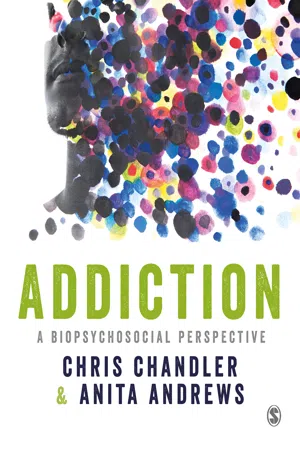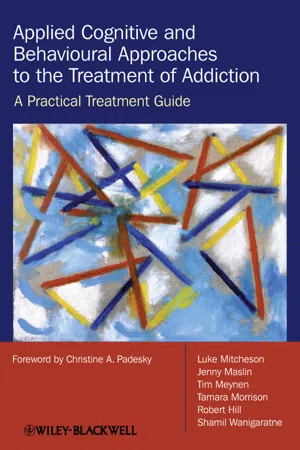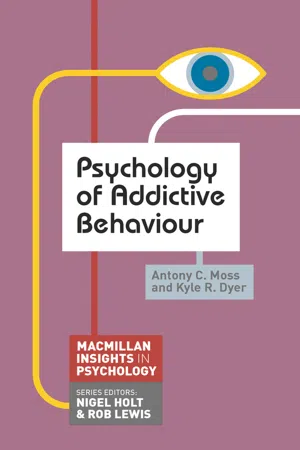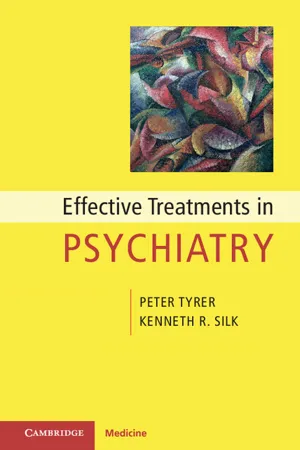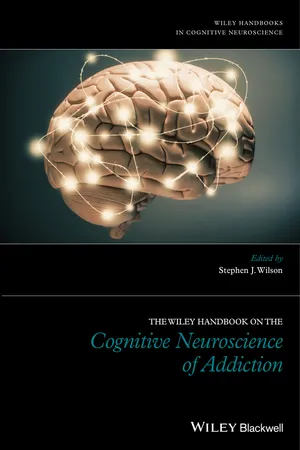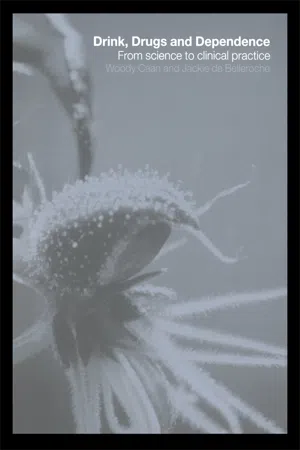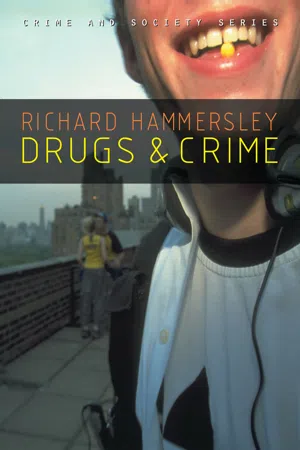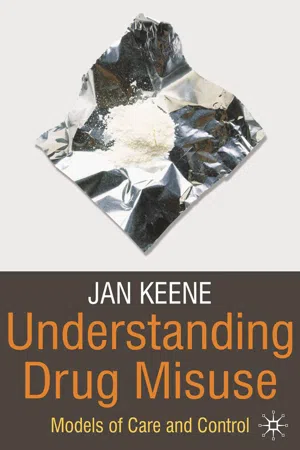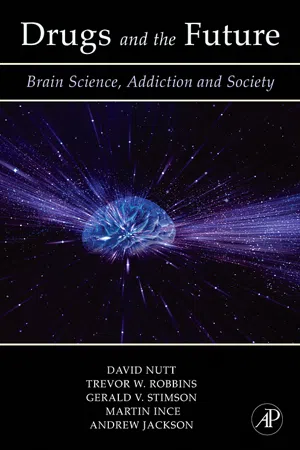Psychology
Addiction Treatment
Addiction treatment refers to the interventions and therapies designed to help individuals overcome substance abuse or behavioral addictions. It typically involves a combination of medical, psychological, and social support to address the physical, emotional, and social aspects of addiction. Treatment approaches may include detoxification, counseling, support groups, medication, and lifestyle changes to promote recovery and prevent relapse.
Written by Perlego with AI-assistance
Related key terms
1 of 5
12 Key excerpts on "Addiction Treatment"
- eBook - ePub
Addiction
A biopsychosocial perspective
- Chris Chandler, Anita Andrews(Authors)
- 2018(Publication Date)
- SAGE Publications Ltd(Publisher)
7 Psychological TreatmentsChapter OverviewIdeally, treating addiction requires an individualised approach, reflecting the multi-faceted nature of the problem and its variability between and within individuals. Psychological treatments can also be combined with pharmacological treatments, where this is appropriate. The psychological treatments covered in this chapter are illustrative examples, and there are other approaches not covered here. All successful psychological treatments incorporate many common elements, as illustrated by the treatment approaches which are discussed in this chapter.This chapter will:- Outline some psychological methods for treating addictive behaviour
- Describe different treatment approaches and the common elements that they share
Learning Aims of the Chapter
- To have an awareness of different psychological approaches to Addiction Treatment and the contexts for their use
- To understand the rationale behind different treatment approaches and how they can be effectively combined
- To have an awareness of the common factors shared by successful treatment approaches
- To have an awareness of the limitations of different approaches
Introduction
Since behaviour change is fundamental to recovery from addiction, a general framework for understanding an individual’s readiness, or motivation to change, is presented at the beginning of this chapter. This model, the transtheoretical model (TTM) of change, has been influential in guiding clinical practice, although it has also generated criticism.The psychological treatments considered in this chapter recognise the importance of learning, cognition, context and interpersonal interaction, in addiction development, maintenance, relapse and recovery. The first treatment approach to be considered is Motivational Interviewing (MI). MI evolved from clinical observation and research in the field of addiction, but has now become more broadly applicable to other types of behaviour change. This approach is often successfully paired with other treatment approaches, including Behavioural Therapy, Cognitive Behavioural Therapy and Relapse Prevention techniques, which will be detailed in subsequent sections of this chapter. The final section of this chapter will consider the power of group therapy, in particular the twelve-step community of Alcoholics Anonymous, and a more recently developed group approach called SMART Recovery. - eBook - PDF
- Ed Day(Author)
- 2021(Publication Date)
- RCPsych Publications(Publisher)
Chapter 8 Psychological Approaches to Addiction Rob Hill and Jennifer Harris Introduction Psychological theory and practice have a lot to offer in terms of understanding addictive patterns of behaviour, yet despite the theoretical advances that have occurred over the years, change at the individual level often remains slow and precarious. Motivation to change sometimes appears as a magical moment seemingly unrelated to the severity of symptoms, and when change does occur it often follows what Marlatt and his colleagues have called ‘the rocky road to recovery’. White has acknowledged this problem and notes that while there have been many advances in our knowledge and treatment of addictions, not least in the field of cognitive behavioural therapy (CBT), there are still limitations in the efficacy of addictions treatment [1]. Thus, some clients, generally those whose substance use is part of a broader cluster of problems, quickly relapse after treatment. This finding has led to a call for a reorientation of treatment away from an acute care model to a recovery management model or what White calls ‘focusing on the lived solution’. Put simply, tackling dependency, while an important first step in the process of change, is rarely sufficient to maintain change over time or indeed to necessarily create a better life. Thus, many self-help groups are increasingly focusing on what is known as ‘recovery capital’, which refers to the sum of resources necessary to initiate and sustain recovery from substance misuse. As such it conveys a more positive way of conveying to clients the reasons for ensuring a robust relapse prevention strategy. Theories and Interventions for Addictive Behaviour Psychoanalytic Theories of Addiction Psychoanalysis, as conceived by Freud, is both a theory and a treatment which seeks to understand conflicting elements or parts that often remain hidden or inaccessible (uncon- scious) to an individual without treatment. - eBook - PDF
Applied Cognitive and Behavioural Approaches to the Treatment of Addiction
A Practical Treatment Guide
- Luke Mitcheson, Jenny Maslin, Tim Meynen, Tamara Morrison, Robert Hill, Shamil Wanigaratne(Authors)
- 2010(Publication Date)
- Wiley(Publisher)
There is a great deal of debate about the meaning of the term ‘addic- tion’. It is used in academic circles as well as in everyday discourse. In acknowl- edgement of this broad use we have used it in the title of our book. However, as psychologists, wherever possible we seek to describe behaviour and therefore also use the term ‘addictive behaviour’. To be more specific, we also use the term ‘substance use problems’ to indicate that the focus of this book is on the prob- lematic use of substances, not substance use per se. The term ‘substance use prob- lems’ includes a range of substance-related difficulties, including addiction and all the generally used diagnostic criteria for dependency and misuse. By substances we mean all psychoactive drugs, including alcohol. We also use the term ‘substance misuse’ in the context of describing services and with reference to the treatment field as this term is commonly used in these contexts. Other terms, such as sub- stance abuse, are used with reference to their use in original texts. Whatever you prefer or your own service uses, always remember that it is the language the client uses that is key. Language, even when technically accurate, can alienate and confuse, and medical descriptions in particular can stand in the way of sharing intimate experiences. As a therapist it is important to know and to be able to share with clients three particularly important assumptions underlying the CBT approach to treating sub- stance use problems. 1 Addiction is a learnt behaviour Substance dependence emerges over time with repeated use of drugs or alcohol. In this way it could be described, perhaps controversially, as a learnt behaviour. Although substance dependence is clearly complicated by biological/psychophar- macological events and social contexts it is useful to think about it in terms of the principles of learning theory. CBT has its origins in behavioural theory and therapy. Key concepts are classical and operant conditioning. - eBook - ePub
- Antony C. Moss, Kyle R. Dyer(Authors)
- 2010(Publication Date)
- Bloomsbury Academic(Publisher)
There are many different types of treatments and many different theoretical approaches underpinning these different treatment approaches. Many treatment programmes will combine elements from the different approaches, while others adopt a single approach. The essential key to achieving success in treatment is to find the best match for the individual. It may be necessary to try a variety of different approaches before the approach that best suits is found.This chapter will provide a brief overview of some of the more important pharmacological (that is, medical) and psychosocial treatment approaches that are in current use. Each of these different approaches is built upon the basic elements of addictive behaviour that we have discussed in this book. The focus of this chapter will be upon the treatment of alcohol and other drug dependence; however, many of the elements covered can also be applied to other addictive behaviours.An overview of the process of drug dependence treatment
Before describing some of the treatment approaches available, let’s start by describing the broad categories of treatment and the general process of providing treatment.Many drug users will be reluctant to enter treatment, especially if they are in the precontemplation stage of change (see Chapter 1 ). There are significant health and psychosocial harms associated with drug dependence, indeed with any addictive behaviour. For some people it is frequently a crisis, such as financial or legal problems, that triggers a desire to receive treatment. As such, it is important to be able to engage with these people quickly, to take advantage of this increased motivation.No matter what stage of change the person is in, the first step in reducing the harms to the individual and to the broader society associated with drug dependence is to make contact with the individual. The first category of treatment, which we can describe as making contact with drug users - eBook - PDF
- Peter Tyrer, Kenneth R. Silk(Authors)
- 2011(Publication Date)
- Cambridge University Press(Publisher)
Alcohol 5 Psychological treatments of alcohol use disorders Based on “Psychological treatments of alcohol use disorders” by Deirdre Conroy, Kirk J. Brower, Jane Marshall and Mike Crawford in Effective Treatments in Psychiatry, Cambridge University Press, 2008 Introduction Treatment for alcohol dependence is usually composed of three phases: management of the alcohol with- drawal syndrome, motivation for and initiation of abstinence, and prevention of relapse. Both pharma- cological and psychosocial interven- tions are used in the prevention of relapse, either separately or in com- bination. These interventions do not operate in a clinical vacuum, and their effectiveness is associated with a number of variables including pre- morbid client/patient characteristics, severity of alcohol dependence, therapist characteristics, and the process of treatment delivery. Treatment outcomes are likely to be different in different countries. For instance, European outcomes have historically been less favourable than outcomes in the USA. Although severe alcohol problems are chronic and intermittent, randomized studies have not been designed to study long-term treat- ment perspectives. Most studies assess treatment interventions between 1 and 3 months’ duration with 1-year follow-up. 39 Summary of details This chapter will summarize psycho- logical treatments. Psychological treatments include psychosocial and behavioural treatments and involve a professional relationship between a therapist and a patient who work together to accomplish specific improvements in behaviour, thinking, mood regulation, and self-esteem. These treatments constitute the pri- mary professional interventions for alcohol dependence, whereas phar- macotherapy and other interventions are generally thought of as adjunctive to psychological treatment. - Stephen J. Wilson(Author)
- 2015(Publication Date)
- Wiley-Blackwell(Publisher)
Section V Cognitive Neuroscience and the Treatment of Drug AddictionPassage contains an image
15 The Neurocognitive Mechanisms Underlying Psychosocial Interventions for Addiction
Sarah W. Feldstein Ewing and Jon M. HouckMotivational Interviewing as a Case StudyIntroduction
Substance use affects a large proportion of the American population. For example, among adults, approximately 17% of men and 8% of women meet criteria for alcohol dependence at some point during their lives (e.g., Hasin, Stinson, Ogburn, & Grant, 2007). Similarly, emerging adults (ages 18–25) evidence high rates of drinking and related problems, 71% using alcohol, 49% engaging in high-risk binge drinking (4+ drinks per episode/females, and 5+ drinks per episode/males: SAMHSA, 2006), and 31% meeting criteria for alcohol use disorders (Knight et al., 2003). In addition to the high rates of alcohol use throughout the United States, cannabis has rapidly become the most frequently abused illicit substance worldwide. This prevalence is evident among American youth, most of whom have tried alcohol and cannabis at least once by the end of high school (alcohol = 79%, cannabis = 49%: CDC, 2012). Furthermore, many American youth do not limit their experimentation with these substances to just one instance. Rather, in the month before being surveyed, between a third and half of American youth engaged in substance use (alcohol use = 48.4%, binge drinking = 31.5%, cannabis use = 28%; CDC, 2012).These high rates are significant because problem substance use results in substantial levels of morbidity and mortality, 3.8% of global deaths being attributable to substance use (e.g., Rehm et al., 2009). While many interventions exist, psychosocial treatments are the most frequently utilized (DHHS, 2009). However, they have widely varying outcomes (e.g., 26%–96% abstinent at a 1-year follow-up; see Project MATCH Research Group, 1998; UKATT Research Team, 2005; Anton et al., 2006; Dutra et al., 2008). This wide range of treatment outcomes indicates the need to better understand how psychosocial interventions may operate.- eBook - ePub
Drink, Drugs and Dependence
From Science to Clinical Practice
- Woody Caan, Jackie de Belleroche(Authors)
- 2003(Publication Date)
- Routledge(Publisher)
Chapter 16 Treatment options across the addictions
John McCartney
Key points
The focus of this chapter is to understand the reasoning behind treatment choices. It does not offer a ‘recipe’ for treatment, which would only fit a particular time and place. It does aim to promote decision-making skills which can be applied wherever the problems of dependence are encountered:- Treatment methods are influenced by causal beliefs. The biopsychosocial view fits the evidence most adequately at the current time.
- Although assessment and treatment overlap, a comprehensive, multidisciplinary evaluation or assessment is generally required before medical or psychosocial options can safely be selected and integrated into a coherent treatment plan.
- Possible medical interventions and pharmacotherapy are described. These methods tend to parallel psychosocial approaches, at least in more intensive treatment settings.
- Selected psychological and psychosocial options are described and illustrated, with an emphasis on systems thinking.
- Treatment evaluation supports the use of different methods, with an emphasis on matching according to client characteristics and needs, The optimal, coherent integration and differentiation of the various options is a crucial issue for clinicians and researchers to investigate in more depth.
Introduction to treatment approaches
A close bond exists between beliefs concerning the causes of addiction and actions towards those who experience such difficulties. Moral condemnation, attempts to impose legal sanctions, religious persuasion and medical (biological) treatments have all been used in the past because their use was implied by the dominant belief system or zeitgeist. In more recent times, although the medical-psychiatric view has tended to predominate, social and psychological causes have been given more attention, altering the way addicts are ‘managed’ or ‘treated’ and resulting in a biopsychosocial (i.e. biological-psychological-social) perspective. Whilst being integrative, this view retains respect for variability amongst drug users, especially regarding their own beliefs about causality, therefore also serving to differentiate - eBook - PDF
Cognitive-Behavioural Therapy in the Treatment of Addiction
A Treatment Planner for Clinicians
- Christos Kouimtsidis, Paul Davis, Martine Reynolds, Colin Drummond, Nicholas Tarrier(Authors)
- 2007(Publication Date)
- Wiley-Interscience(Publisher)
It is also unclear what the most effective method of delivery of CBT, or the key ‘active ingredients’, or the optimal ‘dose’ of intervention is. This type of ‘dose’ and process research has been more fully 24 COGNITIVE-BEHAVIOURAL THERAPY IN THE TREATMENT OF ADDICTION carried out in relation to other mental disorders, and this research should be con-ducted in the addiction field. Therefore, greater clarity on the precise methods of psychosocial intervention is needed in future research. The majority of the research has also taken place in the US and there is a limited evidence base in UK clini-cal settings, especially for contingency management and community reinforcement approaches, which are rarely used in the UK at present (Wanigaratne et al. , 2005). Hence, more research is needed outside of the US on psychosocial interventions so generalizability can be established to other treatment systems and countries. There is also limited evidence on the cost effectiveness of psychological treatment in UK clinical settings. The cross-cultural implementation and testing of psychosocial in-terventions would be assisted by publication of treatment manuals used in research studies. Proposed model of cognitive-behaviour therapy in addiction Cognitive-behaviour therapy as presented in this book is a short-term, focused psychotherapy, which addresses specific problem areas of substance use. It may be particularly useful for therapists helping individuals to deal with some of the practical and more immediate aspects of their substance use problems, which are crucial to making progress in dealing with more fundamental aspects of their prob-lems. However, it is not a definitive treatment, and it does not explore or resolve some of the deeper and more pervasive problems that some people may experience in association with their substance use. - eBook - ePub
Drugs and Crime
Theories and Practices
- Richard Hammersley(Author)
- 2015(Publication Date)
- Polity(Publisher)
As well as being ‘addicted’ or ‘dependent’, many users can be classified as ‘abusers’ of drug or alcohol. In a nutshell, this means that they do not fit criteria for dependence, but they have experienced significant problems related to their substance use and have persisted with use nonetheless. Both the DSM-IV-R (American Psychiatric Association, 1994) and the ICD-10 (WHO, 2007) contain diagnostic criteria for abuse. Simply talking of ‘drug or alcohol problems’ is also sometimes necessary, applying better, for instance, to people whose use may jeopardize their health in the future but is not a problem in the present. This would include the large number of people who binge drink (more than eight units of alcohol per session) on a regular basis.If dependence is not a distinct biological state, but a descriptive syndrome, then these precise definitions are not so important in deciding treatment. Fortunately, the best-evidenced treatments, including cognitive behavioural therapy, motivational interviewing and systemic therapies, take an individual approach to formulating the client’s problems and developing a treatment plan. Moreover, the activities that actually occur in drugs agencies often address problems wider than substance use (Hammersley, Reid and Minkes, 2006).Outcomes for treatment of substance problems
For the reasons outlined above, abstinence is not the only acceptable outcome of treatment. Even for people with very serious problems, where abstinence would clearly be the ideal, other treatment outcomes are worthwhile. These include:- better mental health
- better physical health
- lower mortality
- better social and emotional functioning
- less offending
- less problematic and disruptive behaviour for others
- more stable lifestyle
- substance use less predominant in the person’s life
- substance use in more appropriate ways
- reduced quantity and frequency of use
- not forgetting abstinence.
Many practitioners have become wary of abstinence as the fundamental objective of treatment, not because it is wrong – indeed it is often highly desirable – but because it diverts thought and effort away from other worthwhile objectives that may be more immediately achievable and can be necessary stepping stones to abstinence.Generic properties of efficacious treatment
Efficacious treatments are those that have been shown to be capable of working, which does not mean that they will always be effective, with every client, with every counsellor and in every situation. For drug and alcohol problems, such treatments have a number of general characteristics. First, they involve the basic principles of effective counselling, which requires a successful interpersonal relationship between counsellor and client that includes warmth, effective communication and mutual positive regard (Jarvis et al., 2005). Second, for more intractable problems they are relatively long-term (Orford, 2001), although brief interventions, sometimes only one or two sessions, suffice for people who can easily change their behaviour given initial prompting (Dunn, Deroo and Rivara, 2001). For example, many young cannabis users moderate their use if they come to recognize that it is important to do so, as can many heavy-drinking middle-aged men (Saitz et al., 2007). Third, efficacious treatments are wide and flexible in defining useful outcomes and working towards these, rather than relying only on more ambitious outcomes such as abstinence or cessation of offending. Wider outcomes include changes that cause less harm and stabilize and improve the person’s life. For example, homeless people might be helped with housing. Fourth, they focus on facilitating change in the client, rather than on analysing the past, seeking explanations as to why the client developed their problems, or letting the client express their feelings, although all these activities can be important for change. Finally, they focus on empowering the client to cope with difficult situations where they are likely to ‘relapse’: ‘Quitting smoking is easy, I’ve done it hundreds of times’ (Mark Twain; www.famousquotes.com - eBook - PDF
Understanding Drug Misuse
Models of Care and Control
- Jan Keene(Author)
- 2010(Publication Date)
- Bloomsbury Academic(Publisher)
(2009a), Heather et al . (2002), Stockwell (2006), Witkiewitz and Marlatt (2006), Babor et al. (1999) and Morgenstern and McKay (2007). This work on the psychological interpretation dependence has to a greater or lesser extent adapted cognitive psychol-ogy to the particular problems of dependence generally. This approach is also particularly useful for after-care and relapse prevention. The behavioural approach can be criticized because of the limita-tions of its theoretical base and cognitive psychology can be criticized for its lack of scientific testing but there seems little doubt from the accumulated evidence that psychology has a good deal to offer in the field of dependence. The most severe criticism is that while psychologi-cal theories and methods of treatment are useful in dealing with psy-chological dependencies, they have not yet been shown to be effective in serious cases of physiological dependence. Behavioural interventions Behavioural interventions are concerned with the accurate description of behavioural problems and change in the specific behaviours identi-fied. The approach usually involves close monitoring of concrete changes in behaviour. Initial assessment: Drug use behaviour is likely to have been strongly reinforced over long periods of time. It is necessary in any assessment to identify which variables are important in continuing this reinforce-ment for each individual. Positive and negative reinforcement: The aim is then to change the reinforcing properties of drug use behaviour, either by offering positive reinforcement for non-drug-using behaviours or negative reinforcement for drug use. For example, it is possible to use prescribed drugs (e.g. Naltrexone) to block the physiologically reinforcing effects of opiates (although there is little evidence for effective long term, post-treatment results). Reducing Dependence 45 Cue exposure or extinction: The typical cues for drug use are pro-duced without the reinforcing antecedents. - eBook - PDF
Drugs and the Future
Brain Science, Addiction and Society
- David J. Nutt, Trevor W. Robbins, Gerald V. Stimson, Martin Ince, Andrew Jackson(Authors)
- 2006(Publication Date)
- Academic Press(Publisher)
In opiate depen- dence, much of the focus has been on phar- macological interventions. There is some evidence of the efficacy of psychological interventions in opiate and cocaine depen- dence but there has been very little UK-based research on this to guide service develop- ment, with the exception of the UK CBT in Methadone Treatment Project (Drummond et al., 2004) funded by the Department of Health. This showed that US research may not translate to the NHS setting. Similarly, psychological intervention is the mainstay of cocaine and cannabis treatment and deserves more research. And more research is needed on the cost-effectiveness of psychological treatments delivered in different contexts by different professionals, and in ‘typical’ rather than ‘ideal’ clinical settings. 4.2 Identifying Key ‘Active Ingredients’ of Treatment While we know that psychological treat- ments are effective in treating addictive PSYCHOLOGICAL TREATMENTS 225 disorders, more research is needed to iden- tify the key active ingredients of effective psychological treatments. There is some evi- dence that therapist factors such as skill, style and training are influential. There is also evi- dence that client factors such as readiness to change, gender, social support, severity of problems, and satisfaction with treatment are predictive of outcome (Connors et al., 2000). In addition, there is evidence of interactions between client and therapist factors, includ- ing the importance of therapeutic alliance (Connors et al., 2000; DiClemente and Scott, 1997). This is likely to involve complex inter- actions between a wide range of factors (Moos et al., 1990). Efforts to identify ‘match- ing’ variables, interactions between individ- ual client differences and treatment factors that predict better treatment outcomes, have had limited success so far (e.g. Project Match, 1997). - eBook - PDF
- Ronald Comer, Elizabeth Gould, Adrian Furnham(Authors)
- 2014(Publication Date)
- Wiley(Publisher)
The knowledge acquired is then used by clinicians, whose role is to detect, assess and treat people with psychological disorders. treatment, or therapy systematic procedures designed to change abnormal behaviour into normal behaviour. psychotherapy a treatment system in which a client and therapist use words and acts to overcome the client’s psychologi- cal difficulties. biological therapy the use of physical and chemical procedures to help people over- come psychological difficulties. Despite Frank ’s straightforward definition, clinical treat- ment is surrounded by conflict and confusion. Carl Rogers frequently expressed the opinion that therapists are not in agreement as to their goals or aims; they are not in agree- ment as to what constitutes a successful outcome of their work; they cannot agree on what constitutes a failure; and that the field seems to be completely chaotic and divided. Some clinicians view disorder as an illness and so con- sider therapy a procedure that helps cure the illness. Others see disorder as a problem in living and therapists as teachers of more functional behaviour and thought. Clinicians even differ on what to call the person who receives therapy. Those who see abnormality as an illness use the label patient, while those who view it as a problem in living refer to the client. This chapter will use both of these common terms inter- changeably. All agree therapy of some kind is necessary and will be effective to differing degrees. Treatment in the Modern Context LEARNING OBJECTIVE 1 Explain who currently receives treatment for psychological problems, how they enter treatment and what general features characterize types of treatment. Surveys suggest that more than 15% of people – children, adolescents and adults – receive therapy for psychological problems in the course of a year (NAMI, 2011). The number and variety of problems for which treatments are available have increased during the past 100 years.
Index pages curate the most relevant extracts from our library of academic textbooks. They’ve been created using an in-house natural language model (NLM), each adding context and meaning to key research topics.
